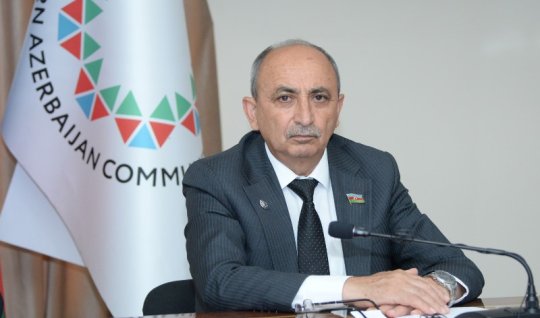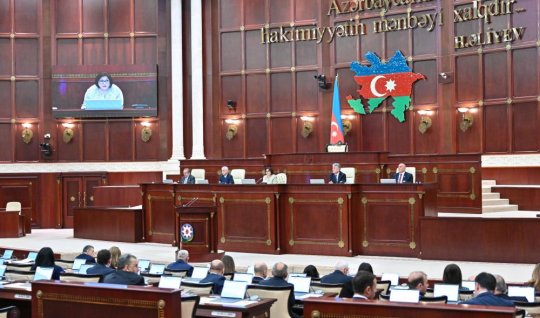Moscow disregarded the warning – Baku response AWAITS

The Azerbaijani embassy located in Kyiv, the capital of Ukraine, has once again become the target of a Russian attack.
During an attack on the city in the late hours of November 14, one of the “Iskander” type missiles fell on the embassy's territory.
The explosion destroyed the fence of the diplomatic mission, and the administrative building, consular department, and service vehicles sustained serious damage. Fortunately, the incident did not result in casualties.
However, this is not the first incident where Russia has struck Azerbaijan's diplomatic mission, as well as its facility.
In March 2022, the building of Azerbaijan's consulate in Kharkiv was damaged during an air attack. At the same time, a car belonging to a consulate employee became unusable.

According to an official statement, Azerbaijan provided the coordinates of the buildings housing its diplomatic missions in Ukraine to the Russian side as early as April 2022. However, the targeting of Azerbaijani diplomatic missions has not ceased.
In January last year, a “Kinzhal” missile launched by Russia created a 3-meter crater just 35 steps from the embassy. The discovery of unexploded ordnance saved the lives of the diplomatic staff at the last moment.
In August this year, an air strike delivered 50 meters away from the embassy in Kyiv damaged the ambassador's residence, the administrative building, and the consular department.
On August 8 and 18, SOCAR's oil base in Odesa was subjected to drone attacks twice, and employees were injured.
This sequence raises the question of whether the attacks against Azerbaijan's diplomatic and economic targets are systematic in nature.

Although the Russian Ministry of Defense confirmed that the coordinates provided by Azerbaijan would be taken into account, the attacks have not ceased. The increasing number of strikes near embassy and consulate buildings already weakens the version of a purely technical error or a “random consequence of war.” The provision of coordinates for diplomatic facilities in war zones is precisely to prevent risks, and non-compliance with these coordinates is considered a violation of international legal obligations.
The timing of successive missile and drone strikes indicates that the targeting of Azerbaijan's diplomatic and economic facilities can no longer be considered accidental incidents.
After nearly a year of tension, a relative softening was observed in the Baku–Moscow line. However, the targeting of the diplomatic mission creates misunderstanding regarding the exact direction of relations. Such strikes are consistent neither with political logic nor with the recent delicate balances formed in bilateral relations.
The continuation of such attacks after the Russian side's promise that “coordinates will be taken into account” increases Baku's concern, and the current situation seriously damages the environment of mutual trust between the parties. Baku awaits answers from Moscow to the unanswered questions...
Elnur Amirov
-
17:05, Bu günIs the attack on our embassy a coincidence? - From MPs REACTION
-
16:37, Bu günMoscow disregarded the warning – Baku response AWAITS
-
16:35, Bu günZelensky spoke with Ilham Aliyev
-
15:39, Bu günIf this reform is implemented incorrectly... - WARNING from an ex-deputy regarding the minister's proposal
-
14:44, Bu günThe referee for the Azerbaijan - France match has been announced
-
14:38, Bu günNegotiations are underway regarding the signing of a final peace agreement - MİRZOYAN
-
14:08, Bu günIsrael another 15 Palestinian bodies to Gaza returned
-
13:27, Bu günWhich territories will the “Trump route” pass through? - DETAILS
-
12:40, Bu gün“Napoli” - “Qarabağ” match tickets on sale - PRICE
-
12:26, Bu günThe return of Arayik and others is not on Pashinyan's agenda - MP
-
12:25, Bu günIn Azerbaijan, 70-90 thousand Akhaltsikhe Turks LIVE
-
12:00, Bu günPashinyan some details of the Copenhagen talks with Aliyev REVEALED
-
11:52, Bu gün"Trump route" will be leased for either 49 or 99 years - Pashinyan
-
11:42, Bu günFormer Prime Minister's residence was confiscated
-
10:41, Bu günA company related to the Zangazur corridor IS BEING ESTABLISHED
-
10:17, Bu günAgricultural targets will not be achieved - Chamber of Accounts
-
09:30, Bu günThe US is not against Turkey's role in the South Caucasus
-
09:23, Bu gün29 national teams have qualified for World Cup 2026 - LIST
-
09:17, Bu günWho will host COP31?
-
08:52, Bu günBBC apologized to Trump
-
08:36, Bu günLeaders of 6 countries gather – Ilham Aliyev was also invited
-
00:47, Bu günLet the ancient Turkic oath be read in the Parliament!
-
00:33, Bu günThe Secretary-General of the CSTO was placed on the “black list”
-
00:17, Bu günDisrespect from Greece to Turkey
-
13 November 2025, 23:58Cease military aid to Kyiv!
-
13 November 2025, 23:24Harsh words from Pashinyan to former leaders
-
13 November 2025, 22:39The Cyprus issue is Turkey's national priority - Erdoğan
-
13 November 2025, 22:24Another aircraft incident in Turkey – no word from the pilot
-
13 November 2025, 21:25Russia's 40 million dollar fighter jet crashed - FATALITIES REPORTED
-
13 November 2025, 20:41Bashar al-Assad's close associate was a MOSSAD agent
























































